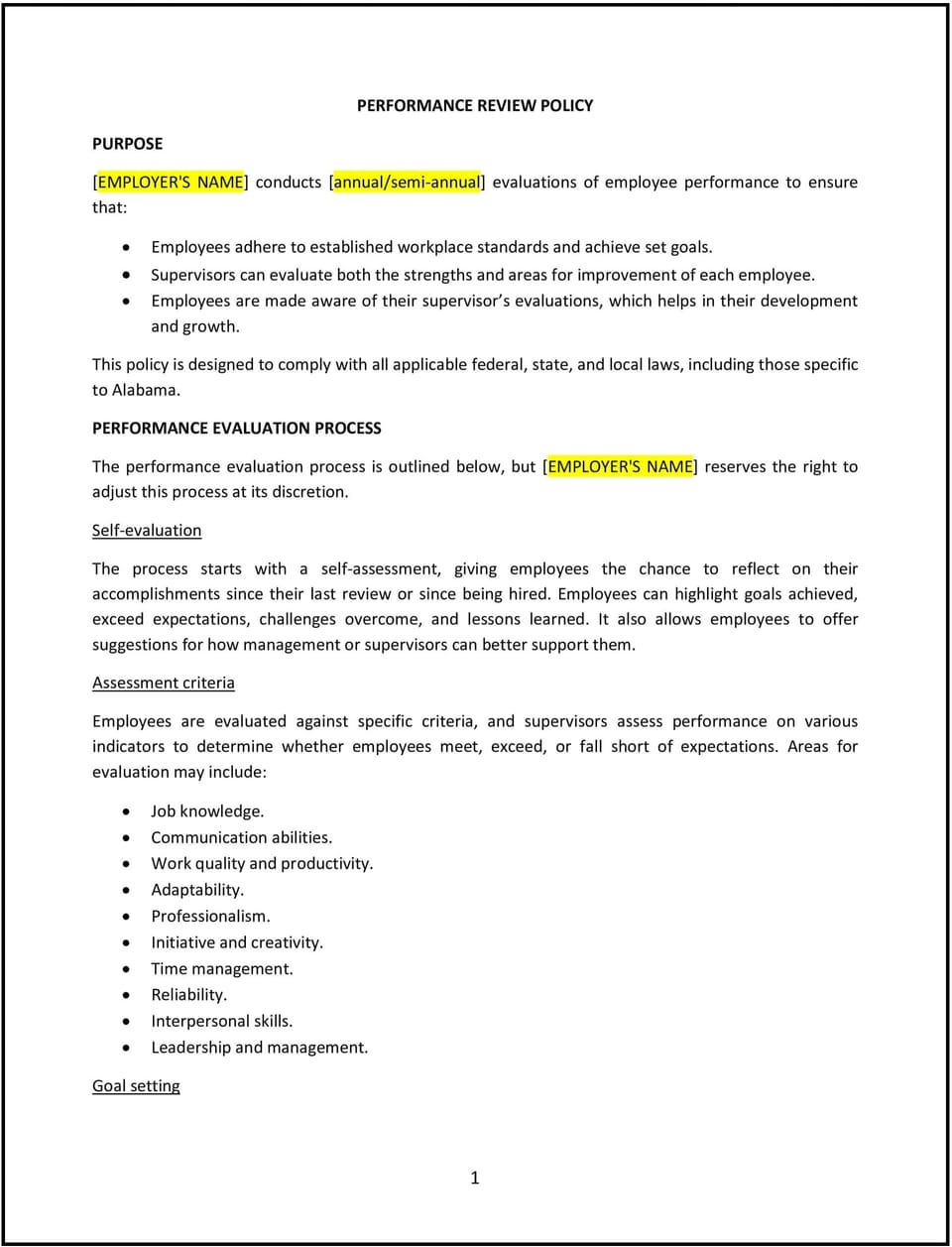Performance review policy (Alabama): Free template

Performance review policy (Alabama)
A performance review policy outlines the procedures and criteria for evaluating employee performance, ensuring a structured approach to feedback and development. For SMBs in Alabama, this policy fosters accountability, promotes professional growth, and aligns individual contributions with business goals.
This policy establishes clear expectations for performance assessments, frequency of reviews, and how feedback will be communicated and acted upon, creating a transparent framework for employee evaluations.
How to use this performance review policy (Alabama)
- Set review frequency: Specify how often performance reviews are conducted, such as annually, semi-annually, or quarterly.
- Define review criteria: Identify key performance indicators (KPIs) or metrics used to evaluate employees, tailored to their roles and responsibilities.
- Include self-assessments: Encourage employees to complete self-assessments before formal reviews to facilitate meaningful discussions.
- Provide feedback structure: Outline how feedback will be delivered, emphasizing constructive input and actionable recommendations for improvement.
- Link to development plans: Use review outcomes to create personalized development plans, including training, mentorship, or goal-setting opportunities.
Benefits of using a performance review policy (Alabama)
A performance review policy provides a foundation for consistent and effective evaluations. Here’s how it helps:
- Encourages employee growth: Identifies areas for improvement and development, fostering skill-building and career advancement.
- Aligns with business goals: Links individual performance to organizational objectives, ensuring alignment across the team.
- Enhances transparency: Establishes clear expectations and processes, reducing confusion or perceived unfairness.
- Boosts motivation: Provides recognition for achievements, improving morale and engagement.
- Supports decision-making: Offers a documented basis for promotions, raises, or performance improvement plans.
Tips for implementing a performance review policy (Alabama)
- Train reviewers: Provide training for managers on delivering feedback, setting goals, and conducting fair evaluations.
- Use standardized forms: Create uniform review templates to ensure consistency across departments and roles.
- Encourage two-way dialogue: Make reviews a collaborative process by allowing employees to share their perspectives and feedback.
- Focus on actionable feedback: Highlight specific behaviors or outcomes and provide clear recommendations for improvement or continued success.
- Monitor follow-up: Track progress on development plans or goals set during reviews to ensure accountability and growth.
Q: How often should SMBs conduct performance reviews?
A: Performance reviews are typically conducted [annually/semi-annually/quarterly], with informal check-ins added as needed to maintain employee engagement and alignment with company goals.
Q: What criteria should be used to evaluate employee performance?
A: Common evaluation criteria include job-specific metrics, alignment with company values, teamwork contributions, and achievement of individual and organizational goals.
Q: Should employees be involved in the performance review process?
A: Yes, involving employees through self-assessments and open discussions fosters a more collaborative and productive review process.
Q: How can SMBs handle disagreements over review results?
A: Employees should be encouraged to provide feedback or seek clarification, with disputes addressed through structured conversations with managers or HR.
Q: How should review outcomes be documented?
A: Outcomes, including feedback and development plans, should be recorded in a secure and organized system, ensuring confidentiality and accessibility for future reference.
Q: What steps should be taken if performance concerns arise during a review?
A: Managers can address concerns by creating improvement plans, offering additional training, or adjusting goals to support employee development and business needs.
This article contains general legal information and does not contain legal advice. Cobrief is not a law firm or a substitute for an attorney or law firm. The law is complex and changes often. For legal advice, please ask a lawyer.


